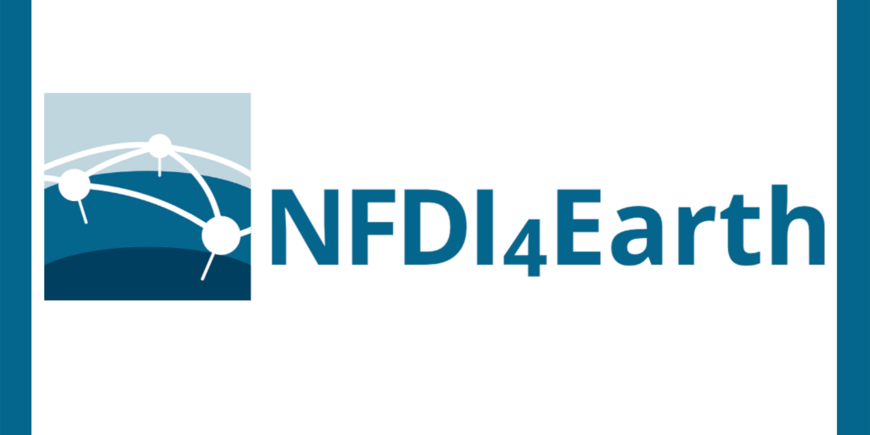Central contribution of GFZ to the National Research Data Infrastructure
In the geosciences, the amount of data available is increasing rapidly due to advances in measurement technology and in high-performance computing. A multitude of sensor and simulation data at high spatial and temporal resolution leads to increasing demands for data handling and processing. At the same time, the diversity of Earth Science data with many niche-standards makes cooperation between the disciplines more difficult. New methods of data analysis adopted from computer science and mathematics, for example the application of machine learning methods, require large amounts of quality-controlled data. There is, therefore, a need for efficient research data management and more powerful collaboration platforms for joint, cross-disciplinary data analyses as the basis of research on Earth system processes.
The NFDI4Earth consortium (National Research Data Infrastructure for Earth) will be supported to establish a service for the Earth system sciences within the framework of the National Research Data Infrastructure NFDI (see background information below). The funding decision was made by the Joint Science Conference (GWK) on 2 July 2021, following the recommendations of an international science-led review process coordinated by the German Research Foundation (DFG).
Consortium develops solutions for the needs of different subjects
NFDI4Earth connects scientists and data management professionals in the Earth system sciences in Germany, helps to create standards for the provision of quality-assured and easily integrated research data, integrates existing research data repositories and develops the next generation of data exchange and data analysis environments for the Earth system sciences in constant dialogue with the community of researchers.
NFDI4Earth provides the necessary foundation for innovative and interdisciplinary research approaches, which will help to address pressing global challenges such as natural hazards, climate change, water scarcity, land use change, and pollution.
NFDI at the GFZ
As co-applicant of the consortium, the GFZ is responsible for the tasks "International Networking" and "Cultural Change in Research Data Management in the Earth System Sciences" and contributes with its broad international network to connect the national initiative NFDI4Earth to international activities and organisations such as the European Open Science Cloud (EOSC). In addition, the GFZ will lead the establishment of the "NFDI4Earth Academy", modelled on the Geo.X Young Academy. The diverse data infrastructures of the GFZ, which are already available to the geoscientific community, will be linked to NFDI4Earth.
This commitment of the GFZ is complemented by its participation in the NFDI4Microbioata consortium, which is also among the consortia selected for funding. Here, the GFZ contributes its expertise in the field of geobiology.
Background: National Research Data Infrastructure
NFDI4Earth is part of the National Research Data Infrastructure (NFDI), which the federal and state governments decided to establish in 2018. The objective of NFDI is to enhance the accessibility and sustainability of research data for German and international science. To this end, the NFDI will set standards in data management and ensure that all relevant research data are securely archived and can be reused for a variety of purposes.
The subject-specific needs for effective research data management of scientists at universities and research institutions are addressed by NFDI consortia - in close cooperation with computer centres, libraries and archives - and joint solutions will be developed and utilised. In three funding rounds, a total of 30 NFDI consortia will be selected, which will be funded with a total of about 85 million euros per year for the next ten years. In the current second selection round, ten additional NFDI consortia were selected for funding support.
Contact:
Prof. Frederik Tilmann
Section head Seismology
Helmholtz Centre Potsdam
GFZ German Research Centre for Geosciences
Telegrafenberg
14473 Potsdam
Phone: +49 331 288-1240
Email: frederik.tilmann@gfz-potsdam.de
Dr. Hildegard Gödde
Head Synergies & Networks
Helmholtz Centre Potsdam
GFZ German Research Centre for Geosciences
Telegrafenberg
14473 Potsdam
Email: hildegard.goedde@gfz-potsdam.de








![[Translate to English:] Torsten Sachs in front of a climate station on a field](/fileadmin/_processed_/3/9/csm__TorstenSachs_bearbeitet_GS_4a1365ef84.jpeg)

![[Translate to English:] left image flood at the Ahrtal: image from above, several houses are flooded; left image:: Heidi Kreibich;](/fileadmin/_processed_/4/4/csm_Bild2_9af0130e9f.png)



![[Translate to English:] Start der Vega Rakete](/fileadmin/_processed_/6/4/csm_20231201-kachel_Vega-VV23-launch_ESA-CNES-Arianespace_706716b68c.jpeg)









![[Translate to English:] Poster exhibition at the Brandenburg Hydrogen Day at the GFZ, some participants in the foreground](/fileadmin/_processed_/6/5/csm_Erster_Brandenburgischer_Wasserstofftag_GFZ_402fcec95e.jpeg)
![[Translate to English:] Group picture of the participants](/fileadmin/_processed_/9/4/csm_20231108_CAWa-Workshop-Tashkent_Gruppenbild_99ea779d8a.jpeg)

![[Translate to English:] [Translate to English:] Hörsaal](/fileadmin/_processed_/e/6/csm_H%C3%B6rsal_e21ac645fb.jpeg)


![[Translate to English:] The Delegations in the Historic Library on the Telegrafenberg. In the back there are from left to right, the Dutch Ambassador for Germany, Ronald van Roeden, the Dutch Minister for Education, Culture and Science, Robbert Dijkgraaf and the scientific director of the GFZ, Susanne Buiter.](/fileadmin/_processed_/d/b/csm_Kachel-2_9eba4b4212.jpeg)

